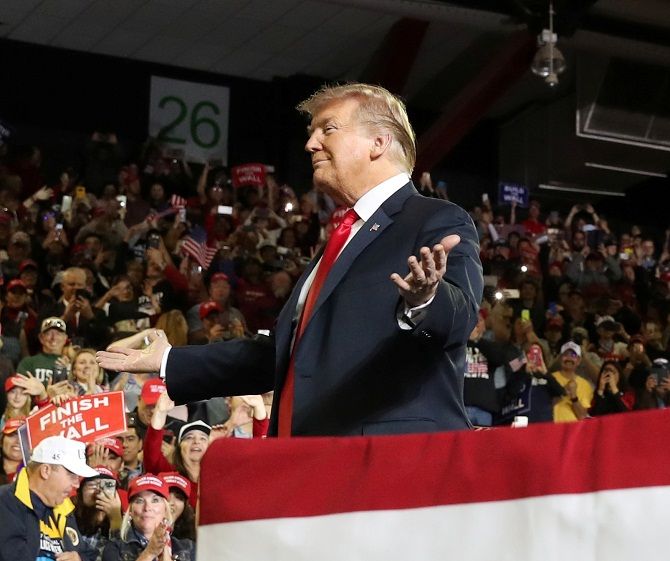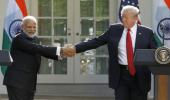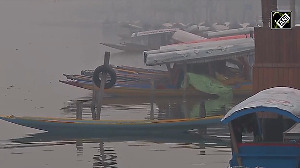'The US and India continue to use their deepening relationship to build new partnerships within and beyond the Indo-Pacific.'

On Saturday, June 1, morning, New Delhi was served a reminder about how close strategic partnership with Washington went hand in hand with intense competition on trade and commerce.
Late on Friday evening (Washington time) President Donald J Trump terminated India's preferential designation as 'a beneficiary developing country for purposes of the Generalised System of Preferences (GSP)', which had provided Indian exports with duty exemptions since November 24, 1975.
'I have determined that India has not assured the United States that India will provide equitable and reasonable access to its markets. Accordingly, it is appropriate to terminate India's designation as a beneficiary developing country effective June 5, 2019,' announced a statement signed by Trump.
Just hours later, Trump's acting Defense Secretary Pat Shanahan, speaking at the Shangri-La Dialogue in Singapore, declared that America was 'increasing the scope, complexity and frequency of its military engagements with India in maintaining a free and open Indo-Pacific.'
Shanahan avoided naming China as a common adversary, but his hardline speech left little to the imagination.
'Some in our region are choosing to act contrary to the principles and norms that have benefited us all,' he said, citing a 'toolkit of coercion' being used to militarise disputed territories, and interference in countries's domestic politics through hybrid influence operations.
Following Shanahan's speech, the Pentagon released an Indo-Pacific Strategy Report (IPSR-2019) entitled Preparedness, Partnerships and Promoting a Networked Region that heavily emphasised the importance of the US-India strategic partnership.
Citing 'shared interests, democratic values, and strong people-to-people ties', the IPSR-2019 said 'the US and India continue to use their deepening relationship to build new partnerships within and beyond the Indo-Pacific.'
The report pointed out that the US had designated India a 'major defence partner' in June 2016, 'seek(ing) to elevate the US defense partnership with India to a level commensurate with that of the US' closest allies and partners'.
It also cited the institution in September 2018 of the US-India 2+2 dialogue, where both countries's foreign and defence ministers together discuss strategic cooperation.
'The signing of the Communications, Compatibility and Security Agreement (COMCASA) in 2018 represents a significant development in our military-to-military relationship, facilitating greater interoperability and real-time secure information-sharing. DoD (Department of Defense) and the Indian Ministry of Defence are increasing the scope, complexity, and frequency of our military exercises. Later this year, the United States and India will conduct our first tri-service exercise,' stated IPSR-2019.
Rebutting criticism within the region that America was not putting enough military force needed to counter an expanding China, Shanahan revealed that the US Indo-Pacific Command (USINDOPACOM), the geographic combatant command responsible for the region, has 200 combat ships and four times the military assets of any other American combatant command.
Citing approximately $16 billion that India has spent on US weaponry since 2008, the report referred to the Defence Technology and Trade Initiative (DTTI), through which 'we are increasing cooperation in defense technology, building industry-to-industry ties, and identifying opportunities for the co-development and co-production of defense systems for the sustainment and modernization of military forces'.
At last year's Shangri-La Dialogue, Prime Minister Narendra Damodardas Modi had delivered the keynote address. Reflecting on the Indo-Pacific, he had observed that '...rules and norms should be based on the consent of all, not on the power of the few'.
This year, because of the election and formation of a new government, India has no high-level representation at the Shangri-La Dialogue.











